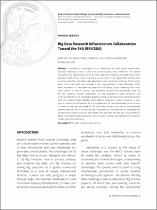| dc.contributor.author | Taylor, Russ | |
| dc.contributor.author | Porto, Fabio | |
| dc.contributor.author | Cui, Chenzhou | |
| dc.date.accessioned | 2022-07-19T09:23:58Z | |
| dc.date.available | 2022-07-19T09:23:58Z | |
| dc.date.issued | 2021 | |
| dc.identifier.citation | Taylor, R. et al. (2021). Big data research infrastructure collaboration toward the SKA (BRICSKA). Anais da Academia Brasileira de Ciencias, 93, e20201027. 10.1590/0001-3765202120201027 | en_US |
| dc.identifier.issn | 0001-3765 | |
| dc.identifier.uri | 10.1590/0001-3765202120201027 | |
| dc.identifier.uri | http://hdl.handle.net/10566/7611 | |
| dc.description.abstract | Astronomy is entering an era of mega-data that will render conventional
research methods as well as data and visual analytics tools ineffective. The Square
Kilometre Array (SKA) drives one of the most significant big data challenges of the next
decades. South Africa, China and India are partners in the global SKA collaboration
and host recently completed, next generation radio astronomy facilities. South Africa,
Brazil, China and India are involved in the Large Synoptic Survey Telescope (LSST),
which represents a complementary mega-data challenge, vastly increasing the current
data volume of optical surveys, and providing critical multi-wavelength data set
for SKA analytics. Russian researchers are also engaged in radio astronomy and
multi-wavelength, multi-messenger projects driving increasing volumes of observational
data. | en_US |
| dc.language.iso | en | en_US |
| dc.publisher | Academia Brasileira de Ciencias | en_US |
| dc.subject | BRICS | en_US |
| dc.subject | SKA | en_US |
| dc.subject | Big data | en_US |
| dc.subject | Astronomy | en_US |
| dc.subject | South Africa | en_US |
| dc.title | Big data research infrastructure collaboration toward the SKA (BRICSKA) | en_US |
| dc.type | Article | en_US |

